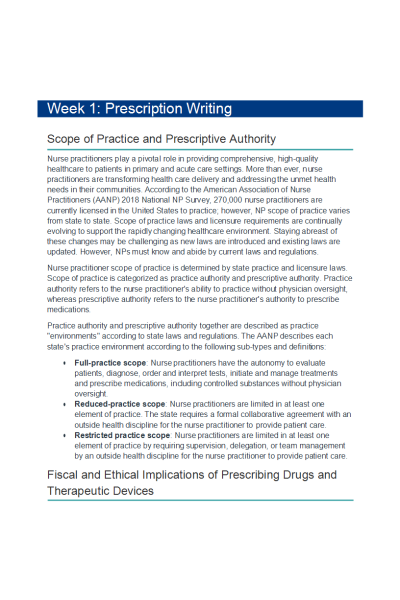Week 1: Prescription Writing
Scope of Practice and Prescriptive Authority
Nurse practitioners play a pivotal role in providing comprehensive, high-quality healthcare to patients in primary and acute care settings. More than ever, nurse practitioners are transforming health care delivery and addressing the unmet health needs in their communities. According to the American Association of Nurse Practitioners (AANP) 2018 National NP Survey, 270,000 nurse practitioners are currently licensed in the United States to practice; however, NP scope of practice varies from state to state. Scope of practice laws and licensure requirements are continually evolving to support the rapidly changing healthcare environment. Staying abreast of these changes may be challenging as new laws are introduced and existing laws are updated. However, NPs must know and abide by current laws and regulations.
Nurse practitioner scope of practice is determined by state practice and licensure laws. Scope of practice is categorized as practice authority and prescriptive authority. Practice authority refers to the nurse practitioner's ability to practice without physician oversight, whereas prescriptive authority refers to the nurse practitioner's authority to prescribe medications.
Practice authority and prescriptive authority together are described as practice "environments" according to state laws and regulations. The AANP describes each state's practice environment according to the following sub-types and definitions:
- Full-practice scope: Nurse practitioners have the autonomy to evaluate patients, diagnose, order and interpret tests, initiate and manage treatments and prescribe medications, including controlled substances without physician oversight.
- Reduced-practice scope: Nurse practitioners are limited in at least one element of practice. The state requires a formal collaborative agreement with an outside health discipline for the nurse practitioner to provide patient care.
- Restricted practice scope: Nurse practitioners are limited in at least one element of practice by requiring supervision, delegation, or team management by an outside health discipline for the nurse practitioner to provide patient care.
Fiscal and Ethical Implications of Prescribing Drugs and Therapeutic Devices
Prescriptive authority for nurse practitioners also regulates prescribing rights beyond medications and controlled substances. These rights include therapeutic devices and services and are outlined in state practice laws and regulations and include Durable Medical Equipment (DME) such as wheelchairs, power scooters, hospital beds, portable oxygen equipment, handicap placards, etc. and medical services such as Physical Therapy (PT), Occupational Therapy (OT), home health services, etc. Prescriptive authority encompasses more than writing a prescription correctly. It requires adherence to ethical guidelines to ensure that patients are safeguarded from harm. Ethical prescribing starts with being well-informed about medications. Mechanism of action, efficacy, and safety are important considerations, as are a patient's distinct needs and circumstances, including the number of medications prescribed (Mitchell & Oliphant, 2016). Most patients receiving a prescription are taking other medications, whether prescription or over-the-counter. Appropriate selection, dosing, and duration of pharmaceutical agents are key to maximizing outcomes and minimizing adverse effects............ Continue
| Instituition / Term | |
| Term | Uploaded 2023 |
| Institution | Chamberlain |
| Contributor | |





























